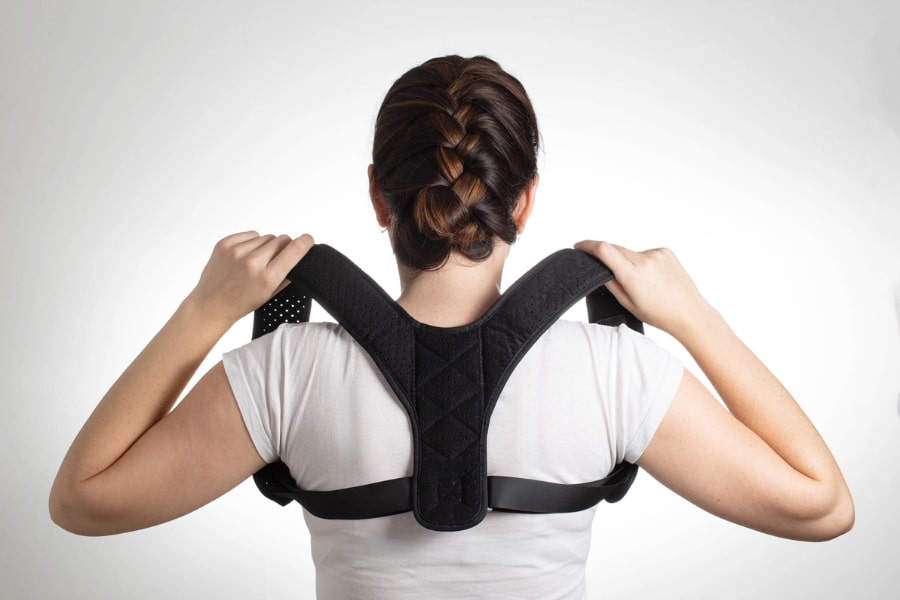
Do Spine Surgeons Recommend Posture Correctors?
When it comes to posture corrector products — I not only recommend them to my patients; I’ve even helped my mom find one that works for her. She had surgery on her back 20 years ago and she’s done great since then. But sometimes she notices that she’s leaning forward, which is a common issue as we age. She wanted something to help her stand up straight, so I suggested a posture corrector.
These wearable devices help us remember to activate the right muscles while doing mundane tasks, like sitting at the office or cooking in the kitchen. For many patients, this is all they need to remind them to focus on good posture, which minimizes pain.
In the post-COVID world, with more and more Americans working in a home office, people are moving less throughout the day, which can add to poor posture and back pain. We used to get in our cars, hop on the train, or walk to work more often. Then we would walk down and up flights of stairs or corridors to enjoy lunch with colleagues. Even just the act of switching chairs, or walking from room to room for conferences and meetings is a change of venue, all of which helps alleviate back pain and potentially improve posture. Posture correctors can play an important role when you aren’t moving as much as you used to — or when you’re hunching, slouching or just generally don’t have ideal posture when you do move.
As a doctor, I do need to say — there isn’t a ton of scientific research on these and they certainly don’t heal conditions of the spine. But I can also tell you anecdotally, including from my own mom, that they can work well for a lot of people.
Some Recommended Posture Correctors
Search online and you’ll find a lot of different options. Here is a sampling, in no particular order, of some of the Posture Correctors that are available. The best one for you likely comes down to fit, comfort and something you’re willing to wear.
Comfy Brace Posture Corrector — $21.97
This Posture Corrector offers a unisex fit, so it might not be the most tailored to uniquely shaped bodies. It is well reviewed by more than 44,000 people. Recommended to alleviate pressure in key areas while working or standing for long periods of time.
Dr Arthritis Store — $14.95
The most affordable Posture Corrector product on this list comes from “the Dr. Arthritis Store.” It’s described as doctor developed and has an adjustable strap that allows you to tailor the tension. It says it can help in the treatment of Scoliosis, Thoracic Outlet Syndrome and Spondylolisthesis. But it should be noted, posture correctors don’t ‘cure’ those conditions or any other back conditions.
Upright Go 2 — $88.95
One unique factor with this one — which could be cool or possibly irritating — is a sensor that vibrates when you slouch to remind you to straighten up. It’s designed primarily for women.
The Upright Go S Light $69.95
This other offering from Upright pairs with an app so you can track personal trends as you work to improve your posture.
Flexguard — $30.99
This is a substantial Posture Corrector, with support extending down to the lower back, eliminating the need for a separate lower back brace.
Hempvana — $84.99
This option is more expensive. Hempvana claims to gently keep the spine and neck aligned. It is made with hemp fiber, is adjustable, and lightweight.
Berlin & Daughter — $29.95
For what it’s worth, I think this is the most appealing Posture Corrector in terms of design. A consumer could wear it to the gym and no one would guess that it’s a posture corrector. The description warns it runs a little large so you may need to order a smaller size than you typically do.
Mercase — $27.99
This Posture Corrector gives additional support down the spine of the upper back, a major culprit for shoulder blade pain as a result of general life stress and repetitive computer-posture strain.
BraceAbility — $229
One of the more heavy duty Posture Correctors on the market is BraceAbility, which is nearly medical-grade for serious posture issues. You’ll want to discuss a Posture Corrector of this complexity with your medical provider before you use it.
Note — if you search online, you will find posture correctors being marketed for children and teens. I recommend talking with your child’s pediatrician or spine doctor before using one on them.
Topics covered
About the Author
Featured Resources
Insights to Achieve a Pain-Free Life



